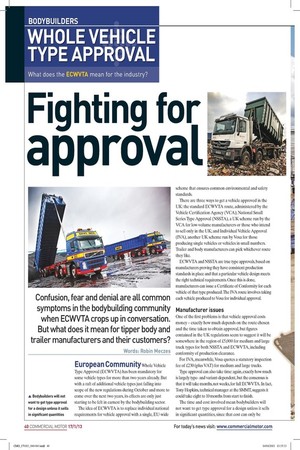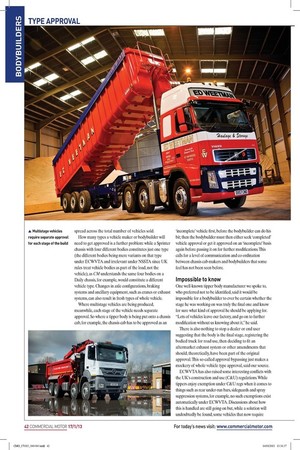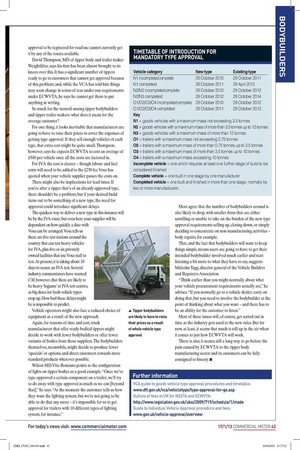Fighting for approval
Page 31

Page 33

Page 34

If you've noticed an error in this article please click here to report it so we can fix it.
Confusion, fear and denial are all common symptoms in the bodybuilding community when ECWVTA crops up in conversation. But what does it mean for tipper body and trailer manufacturers and their customers?
Words: Robin Meczes European Communit ._y Whole Vehicle Type Approval (ECWVTA) has been mandatory for some vehicle types for more than two years already. But with a raft of additional vehicle types just falling into scope of the new regulations during October and more to come over the next two years, its effects are only just starting to be felt in earnest by the bodybuilding sector.
The idea of ECWVTA is to replace individual national requirements for vehicle approval with a single, EU-wide scheme that ensures common environmental and safety standards.
There are three ways to get a vehicle approved in the UK: the standard ECWVTA route, administered by the Vehicle Certification Agency (VCA); National Small Series Type Approval (NSSTA), a UK scheme run by the VCA for low-volume manufacturers or those who intend to sell only in the UK; and Individual Vehicle Approval (WA), another UK scheme run by Vosa for those producing single vehicles or vehicles in small numbers. Trailer and body manufacturers can pick whichever route they like.
ECWVTA and NSSTA are true type approvals, based on manufacturers proving they have consistent production standards in place and that a particular vehicle design meets the right technical requirements. Once this is done, manufacturers can issue a Certificate of Conformity for each vehicle of that type produced.The WA route involves taking each vehicle produced to Vosa for individual approval.
Manufacturer issues One of the first problems is that vehicle approval costs money — exactly how much depends on the route chosen and the time taken to obtain approval, but figures contained in the UK regulations seem to suggest it will be somewhere in the region of £5,000 for medium and large truck types for both NSSTA and ECWVTA, including conformity of production clearance.
For IVA, meanwhile, Vosa quotes a statutory inspection fee of £230 (plus VAT) for medium and large trucks.
Type approval can also take time: again, exactly how much is largely typeand variant-dependent, but the consensus is that it will take months, not weeks, for full ECWVTA. In fact, Tony Hopkins, technical manager at the SMMT, suggests it could take eight to 10 months from start to finish.
The time and cost involved mean bodybuilders will not want to get type approval for a design unless it sells in significant quantities, since that cost can only be spread across the total number of vehicles sold.
How many types a vehicle maker or bodybuilder will need to get approved is a further problem: while a Sprinter chassis with four different bodies constitutes just one type (the different bodies being mere variants on that type under ECVVVTA and irrelevant under NSSTA since UK rules treat vehicle bodies as part of the load, not the vehicle), as CM understands the same four bodies on a Daily chassis, for example, would constitute a different vehicle type. Changes in axle configurations, braking systems and ancillary equipment, such as cranes or exhaust systems, can also result in fresh types of whole vehicle.
Where multistage vehicles are being produced, meanwhile, each stage of the vehicle needs separate approval. So where a tipper body is being put onto a chassis cab, for example, the chassis cab has to be approved as an 'incomplete' vehicle first, before the bodybuilder can do his bit; then the bodybuilder must then either seek 'completed' vehicle approval or get it approved on an 'incomplete' basis again before passing it on for further modifications. This calls for a level of communication and co-ordination between chassis cab makers and bodybuilders that some feel has not been seen before.
Impossible to know One well-known tipper body manufacturer we spoke to, who preferred not to be identified, said it would be impossible for a bodybuilder to ever be certain whether the stage he was working on was truly the final one and know for sure what kind of approval he should be applying for. "Lots of vehicles leave our factory, and go on to further modification without us knowing about it," he said.
There is also nothing to stop a dealer or end user suggesting that the body is the final stage, registering the bodied truck for road use, then deciding to fit an aftermarket exhaust system or other amendments that should, theoretically, have been part of the original approval. This so-called approval bypassing just makes a mockery of whole vehicle type approval, said our source.
ECVVVTA has also raised some interesting conflicts with the UK's construction and use (C&U) regulations. While tippers enjoy exemption under C&U regs when it comes to things such as rear under-run bars, sideguards and spray suppression systems, for example, no such exemptions exist automatically under ECVVVTA. Discussions about how this is handled are still going on but, while a solution will undoubtedly be found, some vehicles that now require approval to be registered for road use cannot currently get it by any of the routes available.
David Thompson, MD of tipper body and trailer maker Weightlifter, says his firm has been almost brought to its knees over this. It has a significant number of tippers ready to go to customers that cannot get approval because of this problem; and, while the VCA has told him things may soon change in terms of rear under-run requirements under ECWVTA, he says he cannot get them to put anything in writing.
So much for the turmoil among tipper bodybuilders and tipper trailer makers: what does it mean for the average customer?
For one thing, it looks inevitable that manufacturers are going to have to raise their prices to cover the expenses of getting type approval. If they sell enough vehicles of each type, that extra cost might be quite small. Thompson, however, says he expects ECWVTA to cost an average of £500 per vehicle once all the costs are factored in.
For IVA the cost is clearer — though labour and fuel costs will need to be added to the £230 fee Vosa has quoted when your vehicle supplier passes the costs on.
There might also be implications for lead times. If you're after a tipper that's of an already approved type, there shouldn't be a problem; but if your desired build turns out to be something of a new type, the need for approval could introduce significant delays.
The quickest way to deliver a new type in this instance will be by the WA route, but even here your supplier will be dependent on how quickly a date with Vosa can be arranged.Vosa tells us there are five test stations around the country that can test heavy vehicles for WA, plus five or six privately owned facilities that use Vosa staff to testAt present, it is taking about 10 days to secure an WA test. Several industry commentators have warned CM, however, that there are likely to be heavy 'logjams' at WA test centres, as big dates for fresh vehicle types crop up. How bad these delays might be is impossible to predict.
Vehicle operators might also face a reduced choice of equipment as a result of the new approach.
Again, for reasons of time and cost, truck manufacturers that offer ready-bodied tippers might decide to work with fewer bodybuilders or offer fewer variants of bodies from those suppliers. The bodybuilders themselves, meanwhile, might decide to produce fewer 'specials' or options, and direct customers towards more standard products wherever possible.
Wilcox MD Vito Ronzano points to the configuration of lights on tipper bodies as a good example. "Once we've type-approved a certain component on a trailer, we'll try to do away with type approval as much as we can [beyond that]," he says. "At the moment the customer tells us how they want the lighting system, but we're not going to be able to do that any more — it's impossible for us to get approval for trailers with 10 different types of lighting system, for instance."
Most agree that the number of bodybuilders around is also likely to drop, with smaller firms that are either unwilling or unable to take on the burden of the new type approval requirements selling up, closing down, or simply deciding to concentrate on non-manufacturing activities — body repairs, for example.
That, and the fact that bodybuilders will want to keep things simple, means users are going to have to get their intended bodybuilder involved much earlier and start listening a bit more to what they have to say, suggests Malcolm Tagg, director general of the Vehicle Builders and Repairers Association.
"Think earlier than you might normally about what your vehicle procurement requirements actually are," he advises. "If you normally go to a vehicle dealer, carry on doing that, but you need to involve the bodybuilder at the point of thinking about what you want — and there has to be an ability for the customer to listen."
Most of these issues will, of course, get sorted out in time as the industry gets used to the new rules. But for now, at least, it seems that much is still up in the air when it comes to just how ECWVTA will work.
There is also, it seems, still a long way to go before the pain caused by ECWVTA to the tipper body manufacturing sector and its customers can be fully consigned to history. • TIMETABLE OF INTRODUCTION FOR MANDATORY TYPE APPROVAL Vehicle category Ni incomplete/complete Ni completed N2/N3 incomplete/complete N2/N3 completed 01/02/03/04 incomplete/complete 01/02/03/04 completed Key Ni = goods vehicles with a maximum mass not exceeding 3.5 tonnes N2 = goods vehicles with a maximum mass of more than 3.5 tonnes up to 12 tonnes N3 = goods vehicles with a maximum mass of more than 12 tonnes 01 = trailers with a maximum mass not exceeding 0.75 tonnes 02 = trailers with a maximum mass of more than 0.75 tonnes up to 3.5 tonnes 03 = trailers with a maximum mass of more than 3.5 tonnes up to 10 tonnes 04 = trailers with a maximum mass exceeding 10 tonnes Incomplete vehicle = one which requires at least one further stage of build to be considered finished Complete vehicle = one built in one stage by one manufacturer Completed vehicle = one built and finished in more than one stage, normally by two or more manufacturers New type 29 October 2010 29 October 2011 29 October 2010 29 October 2012 29 October 2010 29 October 2011 Existing type 29 October 2011 29 April 2013 29 October 2012 29 October 2014 29 October 2012 29 October 2013 Further information 1 VCA guide to goods vehicle type approval procedures and timetable: www.dft.gov.uk/vcavehicletypeitype-approval-for-go.asp Outline of fees in UK for NSSTA and ECWVTA: http://www.legislation.gov.uk/uksi/2009/719/schedule/1/made Guide to Individual Vehicle Approval procedure and fees: www.gov.uk/vehicle-approval/overview








































